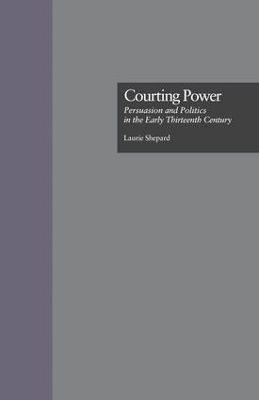
Courting Power
Persuasion and Politics in the Early Thirteenth Century
Seiten
2015
Routledge (Verlag)
978-1-138-86440-5 (ISBN)
Routledge (Verlag)
978-1-138-86440-5 (ISBN)
This book explores the theory and practice of medieval letter-writing, arguing that the form, proportion and style of letters were contoured by ideology.
This text chronicles a change in epistolary persuasion in the 1230's, crystallized at the imperial chancery of Frederick II, Emperor from 1220-1250. There, traditional appeals, premised on authority and harmony, were challenged by letters in which historical circumstances functioned as an integral part of the strategy of persuasion. Based on the close reading of "Artes Dictandi", as well as a series of letters issued from the papal and imperial chanceries, this book explores the theory and practice of medieval letter-writing. Letters are evaluated as verbal acts intended to persuade, with the public as the ultimate arbiter of success. The author argues that the form, proportion and style of letters were contoured by ideology.
This text chronicles a change in epistolary persuasion in the 1230's, crystallized at the imperial chancery of Frederick II, Emperor from 1220-1250. There, traditional appeals, premised on authority and harmony, were challenged by letters in which historical circumstances functioned as an integral part of the strategy of persuasion. Based on the close reading of "Artes Dictandi", as well as a series of letters issued from the papal and imperial chanceries, this book explores the theory and practice of medieval letter-writing. Letters are evaluated as verbal acts intended to persuade, with the public as the ultimate arbiter of success. The author argues that the form, proportion and style of letters were contoured by ideology.
Laurie Shepard
Part 1 Background to the Question; Chapter 1 Framing the Facts in Medieval Epistolary Theory; Chapter 2 Persuasion and Reception; Chapter 3 Pope vs. Emperor: The Issues of Contention; Part 2 Persuasion and Power at the Papal Chancery; Chapter 4 Elevated Prose Style and Power at the Chancery of Innocent III; Chapter 5 Harmony and Conflict at the Chancery of Honorius III; Chapter 6 Limits of Persuasion at the Chancery of Gregory IX; Part 3 Persuasion and Resistance at the Imperial Chancery; Chapter 7 Emergence of a New Paradigm of Persuasion; Chapter 8 Persuasion and the Science of Nature at the Court of Frederick II; Chapter 9 The Failure of Persuasion; Conclusion; Bibliography Index;
| Reihe/Serie | Garland Studies in Medieval Literature |
|---|---|
| Verlagsort | London |
| Sprache | englisch |
| Maße | 138 x 216 mm |
| Gewicht | 317 g |
| Themenwelt | Geisteswissenschaften ► Sprach- / Literaturwissenschaft ► Anglistik / Amerikanistik |
| Geisteswissenschaften ► Sprach- / Literaturwissenschaft ► Literaturwissenschaft | |
| Wirtschaft ► Betriebswirtschaft / Management ► Planung / Organisation | |
| Wirtschaft ► Volkswirtschaftslehre ► Mikroökonomie | |
| ISBN-10 | 1-138-86440-4 / 1138864404 |
| ISBN-13 | 978-1-138-86440-5 / 9781138864405 |
| Zustand | Neuware |
| Haben Sie eine Frage zum Produkt? |
Mehr entdecken
aus dem Bereich
aus dem Bereich
Poetik eines sozialen Urteils
Buch | Hardcover (2023)
De Gruyter (Verlag)
CHF 83,90
Entzauberung und Faszination des Immergleichen in Literatur und Film
Buch | Softcover (2024)
Springer Fachmedien Wiesbaden GmbH (Verlag)
CHF 118,95
Buch | Softcover (2024)
belleville (Verlag)
CHF 27,95


